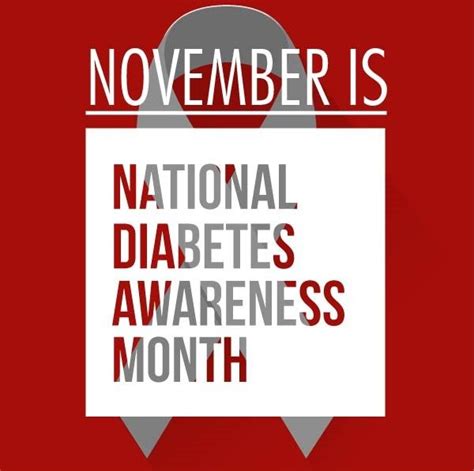
NOVEMBER IS NATIONAL DIABETES AWARENESS MONTH
According to the American Diabetes Association, “1.25 million Americans have type 1 diabetes and 40,000 people will be diagnosed with it this year. Type 1 diabetes occurs at every age, in people of every race, and of every shape and size.
In type 1 diabetes, the body does not produce insulin. The body breaks down the carbohydrates you eat into blood sugar that it uses for energy—and insulin is a hormone that the body needs to get glucose from the bloodstream into the cells of the body. With the help of insulin therapy and other treatments, everyone can learn to manage their condition and live long healthy lives.
Type 2 diabetes is the most common form of diabetes—and it means that your body doesn’t use insulin properly. And while some people can control their blood sugar levels with healthy eating and exercise, others may need medication or insulin to help manage it.
A key part of managing type 2 diabetes is maintaining a healthy diet. You need to eat something sustainable that helps you feel better and still makes you feel happy and fed. Remember, it’s a process. Work to find helpful tips and diet plans that best suit your lifestyle—and how you can make your nutritional intake work the hardest for you.
Fitness is another key to managing type 2. And the good news, all you have to do is get moving. The key is to find activities you love and do them as often as you can. No matter how fit you are, a little activity every day can help fight type 2 and put yourself in charge of your life.” https://www.diabetes.org/diabetes
Type 2 diabetes can be prevented or delayed by limiting your chances of developing prediabetes. The American Diabetes Association says that, prediabetes is a condition that can lead to type 2 diabetes and even heart disease. Your chances of having prediabetes go up if you:
- Are 45 or older
- Are Black, Hispanic/Latino, American Indian, Asian American, or Pacific Islander
- Have a parent, brother or sister with diabetes
- Are overweight
- Are physically inactive
- Have high blood pressure or take medicine for high blood pressure
- Have low HDL cholesterol and/or high triglycerides
- Had diabetes during pregnancy
- Have been diagnosed with Polycystic Ovary Syndrome
OTHER NEWS
Black Women’s Agenda Supreme Court Alert Schuette v. Coalition to Defend Affirmative Action
On Tuesday, April 22, 2014, in a 6-2 decision, the United States Supreme Court upheld a voter-approved change to the Michigan Constitution prohibiting the use of affirmative action in its state public college admissions. This decision upholds a 2006 Michigan ballot initiative where voters approved a prohibition on race-based admissions at state schools. This decision does not change the ability of schools in states that do not have such bans to consider race as one of the factors in their admissions process. Dealing a blow to affirmative action, the Court upheld the ballot initiative as one method of challenging race-conscious admissions policies.
SUPPORT MENTAL HEALTH AWARENESS MONTH LEARN THE SIGNS, RECOGNIZE THE SYMPTOMS, GET HELP
A noted author once wrote, “People assume you aren’t sick unless they see the sickness on your skin.” This month, the National Alliance on Mental Illness (NAMI) and The Black Women’s Agenda, Inc. (BWA) invite you to join the “I’m Into Mental Health” campaign supporting Mental Health Awareness Month by becoming Inspired, Informed, and Involved.
A HEART TO HEART ABOUT CARDIOVASCULAR DISEASE
Knowledge is power, especially when it comes to our health. Take heart disease, for example. What you don’t know can prove fatal. Problems affecting the heart and its blood vessels are the number one killer of women in the United States.
© 2025 The Black Women’s Agenda, Inc. All Rights Reserved. Privacy Policy





